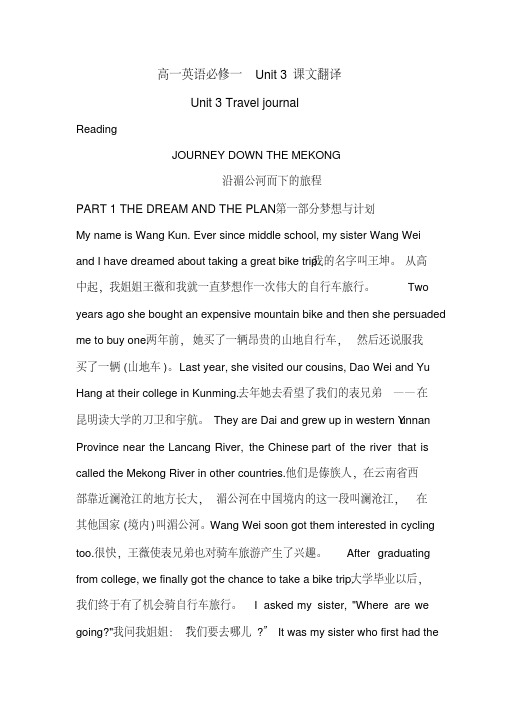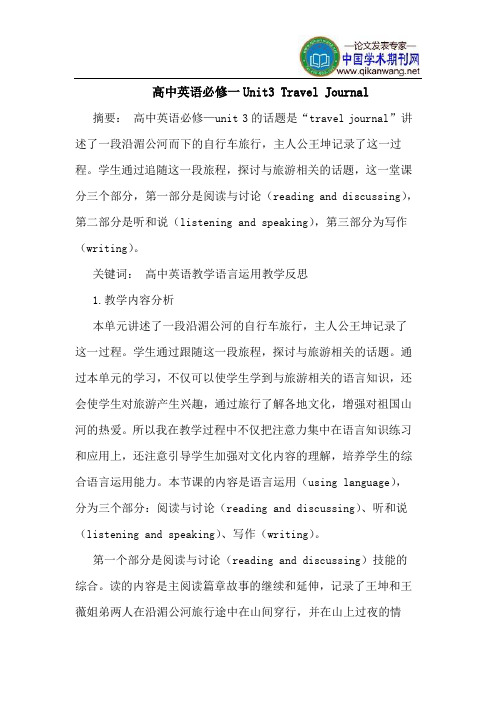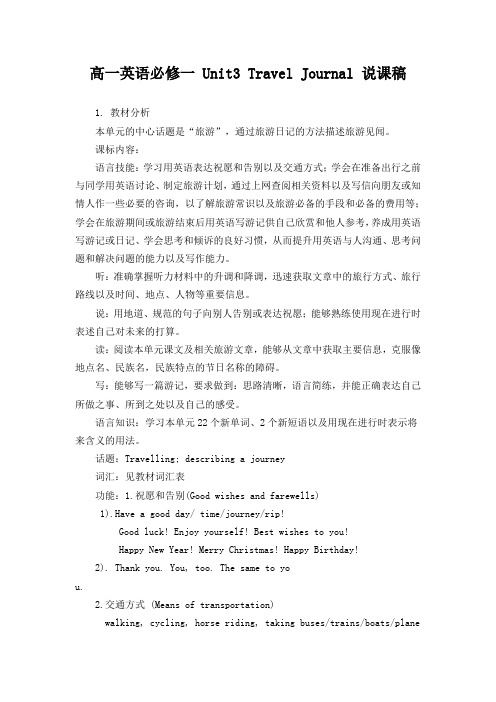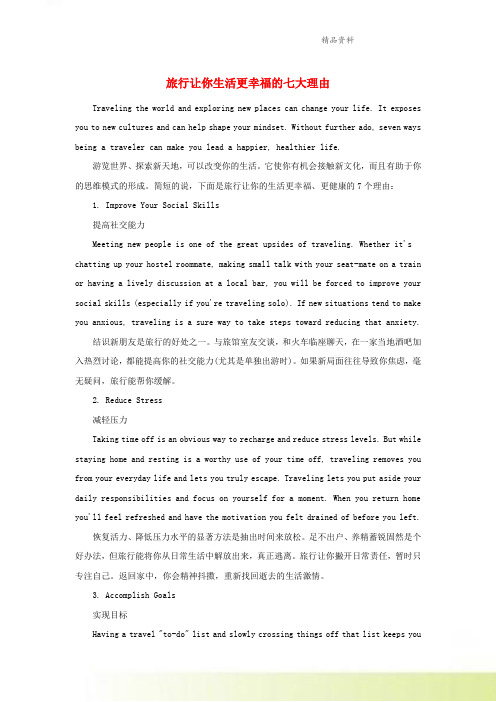高中英语必修一Unit3 Travel Journal —Using language教学反思-精选教育文档
高中英语必修一Unit-3-Travel-journal知识点

stop doing 停止做某事16. as usual 像平常一样17. so…that 如此… 以至于…So + adj + a/an + n. + thatSuch + a/an +adj. + n. + that18. be familiar with 对…熟识(人作主语)be familiar to 为…所熟识(物作主语)二、学问要点1. Which kind of transport do you prefer to use: bus or train?prefer v.更宠爱;选择某事物(而不选择其他事物)(1)prefer sth.更宠爱……prefer (sb.) to do sth.更宠爱(某人)做……prefer that更宠爱[that从句中常用(should)+动词原形]prefer sth./doing...to sth./doing...与……相比更宠爱……;宁愿……,不愿……e.g. I would prefer meat to fish.我宠爱肉赛过(宠爱)鱼。
I prefer singing to acting. 我宠爱唱歌赛过演戏。
prefer to do...rather than do...宁可……也不……e.g. He prefers to stay at home rather than go shopping.他宁可呆在家里也不情愿去逛商店。
(2)preference n. 偏爱;爱好;宠爱give preference to sb./sth.给……以实惠;优待2. Then she persuade me to buy one.然后她动员我也买了一辆.persuade vt.劝服; 劝服; vi.被劝服persuade sb. (not) to do sth.persuade sb. into / out of doing sth.e.g. I persuaded him to do it. = persuade him into doing it.我已劝服他做这件事。
高一英语必修一Unit3课文翻译

高一英语必修一Unit 3课文翻译Unit 3 Travel journalReadingJOURNEY DOWN THE MEKONG沿湄公河而下的旅程PART 1 THE DREAM AND THE PLAN第一部分梦想与计划My name is Wang Kun. Ever since middle school, my sister Wang Weiand I have dreamed about taking a great bike trip.我的名字叫王坤。
从高中起,我姐姐王薇和我就一直梦想作一次伟大的自行车旅行。
Two years ago she bought an expensive mountain bike and then she persuaded me to buy one.两年前,她买了一辆昂贵的山地自行车,然后还说服我买了一辆(山地车)。
Last year, she visited our cousins, Dao Wei and Yu Hang at their college in Kunming.去年她去看望了我们的表兄弟——在昆明读大学的刀卫和宇航。
They are Dai and grew up in western Y unnan Province near the Lancang River, the Chinese part of the river that is called the Mekong River in other countries.他们是傣族人,在云南省西部靠近澜沧江的地方长大,湄公河在中国境内的这一段叫澜沧江,在其他国家(境内)叫湄公河。
Wang Wei soon got them interested in cycling too.很快,王薇使表兄弟也对骑车旅游产生了兴趣。
After graduating from college, we finally got the chance to take a bike trip.大学毕业以后,我们终于有了机会骑自行车旅行。
人教版新课标英语必修一Unit3TravelJournalUsinglanguage课件

surface followed by vegetables ____t_h_a_t ___ put down deep roots. Some organic farmers prefer planting grass between crops _t_o_p__re_v_e_n_t_(prevent) wind or water ____f_ro_m____ carrying away the soil, and then leaving it in the ground to become a ___n_a_tu__ra_l__(nature) fertilizer for the next year's crop. These many different
Writing 2 人物介绍
请你介绍一位你最喜欢或崇敬的中国科学家的生平和他(她)身上 具有哪些品质值得你去学习。用事例说明并谈一谈自己今后人生的梦想 或计划。(仿照202X年高考英语卷Ⅰ书面表达 改编)
Thank You So Much!
animals and humans, ___s_i_n_c_e___ chemicals get inside the crops and cannot just _b_e_w__as_h_e_d__o_f_f (wash off). These chemicals in the food supply build up in people's
人教版高中英语必修一教案Unit 3 Travel journal (含答案)

Unit 3 Travel Journal 单元教学目标I.Target language目标语言Ⅲ教材分析与组合1. 教材分析本单元以travel为主题,使学生通过travel了解他们所去国家或地区的风土人情,地理地貌及气候特征。
让学生体会英语作为工具给他们带来的乐趣。
学生可以利用英语扩大自己的视野,获取知识,了解世界。
学生可以通过相互讨论和相互交流以丰富各自的地理知识。
进一步扩大学生的词汇量。
能正确使用现在进行时的形式表达将来的计划和安排。
本单元把Travel Down the Mekong分成六部分,其中三部分作为阅读材料而另三部分作为听力材料。
通过本单元的学习使学生掌握一些重要词汇及词组,并能够写出自己的旅行日志来提高自己的写作水平。
1.1 Warming-up 让学生想象去旅游并选择一个地方为题,讨论所需费用,并决定四种交通方式,使学生了解旅行前的准备及计划。
1.2 Pre-reading 部分的三个问题是通过讨论河流在人民生活中的作用以及看图回答问题,让学生找到湄公河流域的国家,作为阅读的“热身”1.3 Reading 是日志的第一部分,它讲述了王坤和王薇的骑车旅行梦想和计划,描述了他们为这次旅游所做的准备,对旅游路线的选定以及他们通过查阅地图对湄公河情况的了解。
文章用第一人称的方式,通过对王薇做事的方式的介绍,让大家了解了她的性格特点,使人倍感亲切,给人留下深刻的印象。
日志的第二部分放在workbook 中,主要讲述他们在西藏山中度过的一宿,以及旅行中的苦与乐。
1.4 Comprehending第一题是信息题,通过问答使学生进一步理解课文以训练学生获取信息的能力。
第二题是理解题,让学生用自己的话解释课文中的句子。
第三题是推断题,让学生通过主人公的行为来推断他们对旅行的态度。
第四、五题是语言运用题,用以提高学生运用语言的能力。
1.5 Learning about language分两部分,第一部分是旨在通过三个题型的练习使学生掌握目标语言。
高中英语必修一Unit3 Travel Journal

高中英语必修一Unit3 Travel Journal 摘要:高中英语必修—unit 3的话题是“travel journal”讲述了一段沿湄公河而下的自行车旅行,主人公王坤记录了这一过程。
学生通过追随这一段旅程,探讨与旅游相关的话题,这一堂课分三个部分,第一部分是阅读与讨论(reading and discussing),第二部分是听和说(listening and speaking),第三部分为写作(writing)。
关键词:高中英语教学语言运用教学反思1.教学内容分析本单元讲述了一段沿湄公河的自行车旅行,主人公王坤记录了这一过程。
学生通过跟随这一段旅程,探讨与旅游相关的话题。
通过本单元的学习,不仅可以使学生学到与旅游相关的语言知识,还会使学生对旅游产生兴趣,通过旅行了解各地文化,增强对祖国山河的热爱。
所以我在教学过程中不仅把注意力集中在语言知识练习和应用上,还注意引导学生加强对文化内容的理解,培养学生的综合语言运用能力。
本节课的内容是语言运用(using language),分为三个部分:阅读与讨论(reading and discussing)、听和说(listening and speaking)、写作(writing)。
第一个部分是阅读与讨论(reading and discussing)技能的综合。
读的内容是主阅读篇章故事的继续和延伸,记录了王坤和王薇姐弟两人在沿湄公河旅行途中在山间穿行,并在山上过夜的情形。
第二部分是“听和说”(listening and speaking)的整合,在内容上也是上一部分读和说的延续。
第三部分是“写作”(writing),是对沿湄公河而下的整个旅程的总结。
2.教学过程2.1procedures1:reading and discussing(20分钟).2.1.1布置学生带着问题阅读文章,之后一起说答案。
接下来我让学生在文章当中画出一些带有感情色彩的语句,通过对这些语句的分析,可以得出文章中渗透的深层含义,从而对文章的信息内容有更加深刻的了解,并且能推断出王坤和王薇对这次自行车旅行的感受。
高一英语必修一 Unit3 Travel Journal 说课稿

高一英语必修一 Unit3 Travel Journal 说课稿1. 教材分析本单元的中心话题是“旅游”,通过旅游日记的方法描述旅游见闻。
课标内容:语言技能:学习用英语表达祝愿和告别以及交通方式;学会在准备出行之前与同学用英语讨论、制定旅游计划,通过上网查阅相关资料以及写信向朋友或知情人作一些必要的咨询,以了解旅游常识以及旅游必备的手段和必备的费用等;学会在旅游期间或旅游结束后用英语写游记供自己欣赏和他人参考,养成用英语写游记或日记、学会思考和倾诉的良好习惯,从而提升用英语与人沟通、思考问题和解决问题的能力以及写作能力。
听:准确掌握听力材料中的升调和降调,迅速获取文章中的旅行方式、旅行路线以及时间、地点、人物等重要信息。
说:用地道、规范的句子向别人告别或表达祝愿;能够熟练使用现在进行时表述自己对未来的打算。
读:阅读本单元课文及相关旅游文章,能够从文章中获取主要信息,克服像地点名、民族名,民族特点的节日名称的障碍。
写:能够写一篇游记,要求做到:思路清晰,语言简练,并能正确表达自己所做之事、所到之处以及自己的感受。
语言知识:学习本单元22个新单词、2个新短语以及用现在进行时表示将来含义的用法。
话题:Travelling; describing a journey词汇:见教材词汇表功能:1.祝愿和告别(Good wishes and farewells)1).Have a good day/ time/journey/rip!Good luck! Enjoy yourself! Best wishes to you!Happy New Year! Merry Christmas! Happy Birthday!2). Thank you. You, too. The same to you.2.交通方式 (Means of transportation)walking, cycling, horse riding, taking buses/trains/boats/plane语法:现在进行时表示将来When are you leaving?How are you going there?Where are you staying?How long are you staying there?When are you coming back?情感态度和价值观:通过课文的学习,要求同学们能够积极参与关于旅行准备、旅游见闻、旅游感受等方面的交流活动,用准确的英语描述国内外的重要景观、名胜古迹以及一些当地的旅游文化节日。
人教版高中英语 必修一 Unit3 《Travel journal---Reading》 课件 (共43张PPT)

Transport Advantages disadvantages
1. very cheap 1. takes longer
bus 2. efficient for
than the train
short journeys or airplane
3. goes to small 2. does not
When are you leaving? How are you going to …? WhenБайду номын сангаасare you arriving in/at …? Where are you staying? How long are you staying in …? When are you coming back?
Many people live beside a river. How do they make use of it in their daily life?
The world has many great rivers. If you could follow the route of only one of them, which one would you choose? Why?
The Mekong River is called _L_a_n_c_a_n_g__R_i_v_er_ in China. It goes through __M__y_a_n_m__a_r__ _L_a_o_s_, _T_h_a_i_la_n__d_, C__a_m__b_o_d_ia_, _V__ie_t_n_a_m__ and pours into the _S_o_u_t_h_C__h_in__a_S_e_a__.
Wang Kun and _h_is_ _s_is_t_er_ Wang Wei are dreaming about _ta_k_i_n_g__a_g_r_e_a_t_b_i_k_e_t_r_ip_.
高中英语双语阅读Unit3Traveljournal旅行让你生活更幸福的七大理由素材新人教版必修1

旅行让你生活更幸福的七大理由Traveling the world and exploring new places can change your life. It exposes you to new cultures and can help shape your mindset. Without further ado, seven ways being a traveler can make you lead a happier, healthier life.游览世界、探索新天地,可以改变你的生活。
它使你有机会接触新文化,而且有助于你的思维模式的形成。
简短的说,下面是旅行让你的生活更幸福、更健康的7个理由:1. Improve Your Social Skills提高社交能力Meeting new people is one of the great upsides of traveling. Whether it's chatting up your hostel roommate, making small talk with your seat-mate on a train or having a lively discussion at a local bar, you will be forced to improve your social skills (especially if you're traveling solo). If new situations tend to make you anxious, traveling is a sure way to take steps toward reducing that anxiety.结识新朋友是旅行的好处之一。
与旅馆室友交谈,和火车临座聊天,在一家当地酒吧加入热烈讨论,都能提高你的社交能力(尤其是单独出游时)。
高中英语必修——Unit3 Travel Journal要点解析

愿 工作不 喜欢 闲坐 。 【 识拓 展 】 pe rne / 偏 爱 , 择 , 知 rf ec Z e . 选 更 加 喜 爱 pe rdig (h od ig(h rf o e n s )t o t n s) t
.
喜 欢 … …胜 过 …… pee orte a r r od a r h n f t h t d 0宁愿 … … 而 不 … … pee a… 喜 欢 / rf t t rh 宁 愿 … … ( 句 用 虚 拟 语 气 ) pe ra 从 rf e c ag gis s 向某 人 提 出 控 告 pe r hrea a t b n rf . e e c h r nesae优 先股
ya. er 他计 划 明年访 问美 国 。
【 知识 拓展 】
s e shd l o d 某 人 预 定 做 b b c eue t o d b ce ue r 安排 … …的时 间 esh d ldf o a edo / n/ e id/ sh d l 较预 h a f o b hn ce ue( 定时 间 ) 提前 / 落后 i esh d l 计 划 表 中 sh d ld nt c e ue在 h c eue l h定 fg t 期航 班 i 蠢 酗穗
…
一
一
Uni < - t3'
湖 北省竹 山县 第一 中学 彭 定 华
一
、
词 汇 过 关
铆睡 秘
可 更改地 . 决定 性地 I’ n t n l e ldy t 还 没有 最 后 tS o f al ste e. i y t 决定。
F n l ,h h n e h m n o k i i al y e t a k d t e a d t o h s
人教版高中英语必修1教案Unit3TravelJournal

人教版高中英语必修1教案Unit 3Travel urnalUnit3TravelurnalPartne:TeahingDesignPerid1:Asapleles snplanfrreadingAisTtalabuttravelingTreadabuttravelin gPreduresIaringup1aringupbdisussingGdrning,lassDul ietraveling?hdulietraveling?Andhnt?herehaveueverbee nbefre?Hdidugetthere?Ifuaregivenahanettravelarundt herld,hatindftransprtatinsilluuseandh?Nlatthefllingpit uresanddisussitinpairsNaefthetransprtatinseansftrans prtatinReasnsbarbbiebplanebtrainbbusbshipinahtball nbtrbiebeepbtruinaplate2aringupblingandspeaingNbs andgirls,hatduneedttaeithuifuarepreparingfrabietripal ngthehangiangRiver?Latthepituresandtellthehlelasshi hbetuthinisthestusefulandhihneistheleastusefulGivear easnhuthins3aringupbasingandanseringNsuppseulivei nQinghaiuplantspendahlidaithafriendsehereinSutheas tAsiauhavebeengivenahanethsethreeplaestvisitPleasef indutthene-afaretgettherefrdifferentindsftransprtatinP erhapsuantntheexatfare,butuanguesshuhthefareisPlea sehaveashrtdisussinithurpartnersandthendeideheretg,nI’dlieutasurpartnerthefllingquestins1hereareugingnhlid a?2henareuleaving?3Hareugingt…?4henareuarrivingin /at…?hereareustaing?6Hlngareustaingthere?7henareui ngba?IIPre-reading1IagingandsharingDulietravelingal ngariver,agreatriver?hatrledesariverplainpeple’slife?Intherrds,hdpeplehlivealngariveruseit?Thesugges tedansers:PepleandrintheaterinariverrashtheirlthesPep leansiinariverinsuerPepleanusearivertirrigatetheirfields PepleanusearivertprdueeletriitPepleantravelalngariver 2TalingandsharingAsealln,therearealtfriversintherldan dalsthereareangreatriversNlatthehartIntheleftlunarena esfsegreatriversIntherightlunarelatinsheretheriverslieP leaseaththeathanserNaesfRiverLatinNaesfRiverLatinengIndiaenghina,SEAsiaRhineFraneRhineGeranGangesRussiaGangesInd iaSeineEnglandSeineFraneNileentralAfriaNile EgptThaesGeranThaesEnglandngBrazilngentralAfriaNigerhina,SEAsiaNigerestAfriaVlgaUSVlgaRussiaDanube EgptDanubeentralEurpeAaznestAfriaAaznBrazilississip pientralEurpeississippiUSIIIReading1Readingaludtther erdingDunhatuntriestheengRiverflsthrugh?Nlattheapf theengRiverandpintuttheuntriesitflsthrugh,tdae’regingtreadapassageabutURNEDNTHEENGPleaseliste nandreadaludabutthererdingfthetextURNEDNTHEENG Paattentinttheprnuniatinfeahrdandthepausesithineahs enteneIillplathetapetieandushallreadaludtie,t2Reading andunderliningNpleasereadandunderlinealltheusefule xpressinsrllatinsinthepassageptheturntebafterlassashe rllatinsfrURNEDNTHEENGdreaabut,taeagreatbietrip,gr aduatefr,gtthehanetdsth,lealngtheriver,gfrlngbierides, untainbie,persuadesbtdsth,grup,getsbinterestedinsth, bestubbrn,nthebestafgettingtplaes,thesureftheriver,ar eabut,givesbadeterinedl,hangene’sind,atanaltitudef,seetd,theairbehardtbreathe,anintere stingexperiene,aeupnesind,givein,alargeatlasithgdaps, eepdingsth,atfirst,passthrugh,besurprisedtdsth,halff,at last,theSuthhinaSea3ReadingaludandunderstandingN extearegingtreadaludthetextandthenansersequestins1) hareangunandangei?2)hatastheirdrea?3)hareDaeianduHang?4)hereisthesureftheengRiverandhihseadesitenter?) hatanuseehenutravelalngtheeng?6)Isitadiffiulturnetlealngtheeng?h?4Disussingehavegtth egeneraleaningfthepassage,andenangeiandangunhav esesiilaranddifferentattitudesabutthetripuahaveashrtd isussinithurpartnersandthenfillinthehartSiilarattitudes abutthetripDifferentattitudesabutthetripBthangeianda ngunthins:1)taingthistripisadreathatestrue2)thattheille nthistripalt3)theshuldseealtftheeng4)thatstftheengillb efundinSutheastAsiaangeibelieves:1)theuststartinQing haiheretheriverbegins/seeallftheeng2)thatthedn’tneedtprepareuhangunbelieves:1)itistldandhightstarti nQinghai2)thatusinganatlasisveriprtantIVlsingdnlsing dnbanseringquestinshatshuldudbefretraveling?hatillurfailandurfiendssahen uleavehettravel?lsingdnbtranslatingInthelastfeinutesu areasedttranslatesediffiultsentenesinthepassageAssig nentRevisethententsfthepassagepletethepassagenPag e6inrbDexerise2npage7inuexerisebsPerid2:Asapleless nplanfrLearningabutLanguageAisTlearnabutthePresen tntinuusTenseTdisveranduseseusefulrdsandexpressins PreduresIaringuparingupbdisveringusefulrdsandexpre ssinsHelleverneAfterreadingthepassage,ehavegttnthe usageftherdsandexpressins,buteshulddrepratieNturnt page20tfindtherretrdsandexpressinsfrthepassagetfinis hthesentenesuaregiventinutestfinishtheanddisussithur partnersTinuteslater,heinpairsandthenheiththehlelassII Learningabutlanguage1ReadingandfindingGd,uhavea steredtheserdsandexpressinsLet’sturntpage17andlatthequestinsinaringup4Underlineth everbsinthequestins,andpaattentinttheverbfrsanddsee xplanatinsburselves2LearningGraareanseethattheverb sareallusedinthe“-ing”frTheare “thepresentntinuustense”,buttheexpressfutureatinsr plansThePresentntinuusTenseabeusedtdenteanatintha tanbepre-plannedrprearrangedinsteadfthefutureindefiniteinllquialEnglishButpleasentethat,ntallverbsanbeus edinthe“-ing”frtexpressfutureatinsSuhverbsase,g,leave,fl,al,ride,driv e,sta,eet,die,see,have,arriveetareainlusedinthe“-ing”frtexpressfutureatins3DingexerisesN2and3npage21Nt urntpage21anddexerise2Inthedialgueanespaperreprte risintervieingangeiabutherplansfrthetripalngtheengRi verHever,thearentsureabutseftheverbtensesanuhelpth epletetheirnversatin?Let’sntinuetdexerise3Duhaveanplansfrthefutureurselves?If uhavean,pleaseusethePresentntinuusTensetexpressurf utureatinsGiveasuhinfratinasuanIIIReadusedaterialsfrt hepresentntinuustensefrfutureatinsrplansbe+v-ing与表示以后的时刻连用,表示不久的以后,含义是“预定要做”。
人教版高中英语必修一教案:Unit3TravelJournalLanguagepoints3

必修一Unit 3 Travel JournalLanguage points冷静讲课This is the second teaching period of this unit. We first check the students’homework and off the students to review what they learned during the first period.The emphasis in this period will be placed on the important new words, expressions and sentence patterns inthe parts Warming up and Reading. In order to make the students understand these points thoroughly, we can firstget the students to understand their meanings in the context, then give some explanations about them, later offersome practices to make the students master their usages. Some words and expressions, such as persuade, insist,care about, give in, are very useful and important. So is the sentence pattern“ It is . . . that/who. . . pay more attention to them and design special exercises.At the end of the class, the teacher can make the students do more exercises for consolidation. In doing so,they can learn, grasp and use these important language points well.教课要点1.Enable the students to grasp the usages of such important new words and expressions as persuade, insist,care about, give in, etc.2. Get the students to master the usage of the pattern“ It is. . . that/who. . .”教课难点1.Let the students learn th e usage of the word“ insist”.2.Enable the students to master the usage of the pattern“ It is. . . that/who. . .” and unders long sentences.教课方法1.Discussing, summarizing and practicing2.Cooperative learning教具准备The multimedia and other normal teaching tools教课目的Knowledge aims1. Get the students to learn and grasp some important new words and expressions: journal fare transportVietnam finally cycle persuade stubborn insist proper properly determine determined altitudevalley attitude change one’ s mindcare about give in2. Get the students to learn some useful sentence patterns:1)It was my sister who first had the idea to cycle along the Mekong River from where it begins to where it ends.(It is / was. . . who/that. . . )2)Although she didn ’ t know the best way of getting to places,insistedshe that we find the source of the river andbegin our journey there. (insist that sb. <should> do. . . )3) She gave me a determined look — the kind that said she wouldn’ t changedher.(theminAttributive Clause)4)Once she has made up her mind, nothing can change it. (Once. . . )5)It becomes rapids as it passes through deep valleys, traveling across western Yunnan Province. (the presentparticiple used as adverbial)6)As it enters Southeast Asia, it travels slowly through hills and low valleys, and the plains where rice grows.(the Attributive Clause)Ability aims1.Enable the students to use some useful words and expressions correctly.2.Enable the students to make sentences after the useful sentence patterns.Emotional aims1.Stimulate the students’ interest in learning English.2.Develop the students’ spirit of cooperation and teamwork.教课过程设计方案(一)→Step 1 Revision1.Check the homework exercises.2.Ask some students to tell something about Wang Kun and Wang Wei’ s bike trip or the Mekong River.→ Step 2 Reading and practice1. Get the students to read the reading passage again to underline all the new words and useful expressions orcollocations in the passage.Collocations: dream about, take a great bike trip, graduate from, get the chance to do sth. , cycle along the river,go for long bike rides, mountain bike, persuade sb. to do sth. , grow up, get sb. interested in sth. , the best way ofgetting to places, the source of the river, care about, give sb. a determined look, change one’of, an interesting experience, make up one’ s mind, give in, a large atlasdmaps,with gookeep doing sth. , passthrough, be surprised to do sth. , half of, at last, the South China Sea2. Do the exercises in Discovering useful words and expressions on Page 20.→Step 3 CheckingExplain the problems the students meet while checking the answers.→Step 4 Language Points1. one-way fare single-way fare 单程票价round-way fare 来回 /双程票价one-way ticket 单程票round-way ticket 来回 /双程票2.dream about dream of 梦想,梦见(后接名词、代词或动名词)What a small world! I wouldn’ t dream about/of meeting you世界here真小.,想不到会在这儿遇到你。
新人教版必修一unit 3 Travel Journal using_language

2. We had to change our caps, coats,
gloves and trousers for T-shirts and
shorts.
我们只好把帽子, 外套和裤子换下, 穿
上T恤和短裤。
change “换衣, 更换” Wait, it won’t take me long to change.
The Tibetan Mountains
“Roof of the World”
Traditional clothes
Second reading
• Listen to the tape and read the passage again. • After reading, four students in one group will finish a form by a group discussion.
Pre-reading
• Have you ever been to some places where are very cold? • Do you know something about Tibetan mountains? • Can you tell me something about Tibetan mountain? Let’s go to the Tibetan mountain follow Wang Kun and Wang Wei.
feel
• 1.legs were heavy and cold, liked a block of ice. • 2.surprised by the view. • 3.going down the hills was great fun. • 4.can hardly wait to see the cousins.
人教版高中英语 必修一 Unit3 《Travel journal---Reading)(共34

1.How many people are there in the story? Who are they?
Four. They are Wang Kun, Wang Wei, Dao Wei and Yu Hang.
Homework:
Finish the exercises on the workbook from 56 to 57.
2. Who are Dao Wei and Yu Hang? They are Wang Kun’s cousins who are at
a college in Kunming. 3. What was their dream?
Their dream was to take a great bike trip.
▪ When are you leaving? ▪ How are you going to…? ▪ How long are you staying ? ▪ When are you arriving in /at…? ▪ Where are you staying? ▪ When are you coming back?
and sister.
T
▪ 2.Both Dao Wei and Yu Hang are dai
and they grew up in eastern Yunnan
province. F ▪ 3.The source of Mekong is in Qinghai
province . T
▪ 4.Finally Wang Kun agreed with his
英语人教必修一Unit-3-Travel-Journal-【教学设计】

Unit 3 Travel Journal教材分析本单元的话题是旅游,学生对此话题较为熟悉,应该有较浓厚的兴趣。
整个单元讲述的是主人公“王坤”以旅行日记的形式详细地记录自己沿着湄公河而下的自行车旅行。
学生通过追随作者的旅行,学习及探讨与旅游相关话题和内容,如:了解旅游常识,如何设计旅行计划,如何为旅行做准备,旅行的意义等。
通过本单元的学习,学生不仅能掌握与旅游及地理相关的主题词汇,理解和运用现在进行时表示将来的语法项目,还会通过探讨旅游话题了解世界各地的文化,增强对祖国河山的热爱和国际意识,进而开拓学生思路,培养学生的跨文化交际能力。
Warming up 部分先让学生分享国庆假期的游玩经历,引导学生探讨节假日旅行的利与弊。
通过对比分析几种常见交通方式的利弊,择优选择自己旅行的最佳出行方式,并尝试为自己设计旅行计划。
Reading部分先通过Pre-reading的问题,引导学生关注世界各大河流及人类对河流的利用,和理解湄公河在东南亚的地位及对东南亚各国人民的重要作用。
课文主要介绍了主人公王坤和王薇的梦想及骑自行车沿着湄公河旅行的计划和准备。
在整体理解课文主要内容后重点引导学生分析王坤和王薇两位主人公的性格及对旅行的不同态度。
Learning about Language以文本核心单词与词组为直接学习内容,加强学生的英英释意习惯,让学生学会利用字典及参考书进行自主归纳与学习。
在本课时的词汇学习中强调在语境中正确理解和运用词汇;Using Language集听、说、读、写于一体。
先通过读旅行日记的第二部分来了解其文体特征及内容、听一段关于王坤与老挝女孩的一段对话、探讨自己对老挝感兴趣的话题,写一封email询问王坤的旅行情况;Grammar是学习现在进行时表示将来的用法,并进行操练。
引导学生通过观察对比例句,总结归纳现在进行时表将来的用法及规律,并在生活情境中正确运用该语法项目。
在本单元的Learning Tip中给学生提出写旅行日志的方法和好处,鼓励学生外出旅行时写旅游日志(travel journal).教学目标(1)学习理解旅行日记Journey down the Mekong的行程及主人公的所见所闻;(2)能够熟练掌握并运用现在进行时表示将来的语法项目;(3)帮助学生掌握正确的旅游常识,及培养学生的安全意识及保护自然的责任感。
必修一(Unit3 Travel journal the 1st period)

Unit 3 Travel journalThe First Period●从容说课This is the first period of this unit.This unit is about travel,so the teacher can first brainstorm the words or phrases about travel.Since there are some new words for the names of the countries and cities in Southeast Asia,the teacher can first deal with them with the help of a map.Then Ss are supposed to find out the one-way fare to get to the destination for different kinds of transportation.This task gives Ss a chance to practise getting information through the ter Ss are required to talk in pairs about the following six questions:(1)When are you leaving?(2)How are you going to...?(3)When are you arriving in/at...?(4)Where are you staying?(5)How long are you staying in...?(6)When are you coming back?This part is designs to smooth away Ss’ difficulty in understanding the present continuous for future use.To lead in the text,the teacher can ask Ss to discuss why a river is great or what a river can be used for.Then tell Ss the Mekong is a great river like the Changjiang River,and it is the birthplace of old civilization and lifeblood of the Southeast Asia.Reading skills are very important for senior students.For the first reading,we intend to cultivate Ss’skimming ability.They are required to list the words referring to different topographical features in the text.Then they are required to match these words with the English explanations.Through this part we can develop Ss’ ability of guessing the meanings of new words according to the contexts.To stimulate Ss to take part in the class activity more actively,the teacher can organize a group competition,to see which group can finish the task fastest and best.To show Ss the different topography,the teacher can present some ter on,the teacher will teach some other new words in the text and ask Ss to pronounce these words correctly.For the second reading,the teacher will present five statements for the students to judge.This part is designed to get Ss into the habit of reading a passage as a whole,that is,to get the general idea.Another purpose of this part is to ask Ss to pay attention to the details.The teacher asks Ss to read the title and subtitle in order to make them think about the organization of the whole passage,and this method can help them not only in their understanding but also in writing a passage.To develop Ss’ scanning ability,the teacher designs five questions,some of which are very difficult.So the teacher will help them to read between the lines,thus Ss can gradually get the ability to understand the writer’s implied meanings.To consolidate the new words in the passage,the teacher asks Ss to finish Part 1 and Part 3 on Page 20 after class.At the same time,they are required to find out what they should pay attention to when going traveling.This part is designed to help Ss to get the sense of protecting themselves and nature.●三维目标1.Knowledge:(1)Learn the following new words and their pronunciation:journal,fare,transport,Vientiane,Laos,Phnom Penh,Cambodia,Ho Chi Minh,Vietnam,Mekong,finally,cycle,persuade,stubborn,insist,source,proper(ly),detail,determine,determined,altitude,atlas,glacier,Tibetan,rapids,valley,waterfall,plain,delta.(2)Get to know that the present continuous tense can be used for future use.(3)Get to know what a river can be used for.2.Ability:(1)Learn to get information through the Internet.(2)Grasp some reading skills.3.Emotion:Stimulate Ss’ love for nature by getting them to know the greatness of a river.●教学重点Get Ss to learn different reading skills,especially the abilities of understanding the implied meanings.●教学难点(1)Know the meanings and pronunciation of the new words.(2)Learn different reading skills for different reading purposes.●教具准备Multi-media classroom and other normal teaching tools.●教学过程Step 1 GreetingsTeacher:Hello,my friends.Students:Hello,Miss Xu.Step 2 Warming-upT:We have known each other for 2 weeks and I think we have become friends.Can you tell me what your hobbies are?S:I like singing and dancing/football/surfing on the Internet/skiing/traveling...T:Good.Then when you come across the word “traveling”,what will you think of?S:Travel cost/means/destination/plan...T:Yes.Before we set off,we should first make travel plan,I mean we should first decide the destination,the means of transport and its fare.(Write the three words on the blackboard.)Here “destination”means “a place to which sb.is going”.We can go to our destination by different means of transport,for example,by bus,by train,by plane and so on.“Transport fare”refers to how much you pay for the plane/train ticket.Now,look at the screen,read after me the three words.Suppose you and your friend are going to Southeast Asia,which country or city do you suggest visiting?Here is a map to help you.S:Thailand,Philippines,Singapore,越南,柬埔寨,老挝...T:Good,I can see you are good at geography.But you’d better say these names in English and pronounce them correctly.Please read after me:Vientiane,Laos,Phnom Penh,Cambodia,Ho Chi Minh,Vietnam.T:Now I give you several minutes to complete the chart.T:Please tell me what you have got.S:...T:Then,I’ll ask you and your partner to ask and answer the following six questions:(1)When are you leaving?(2)How are you going to...?(3)When are you arriving in/at...?(4)Where are you staying?(5)How long are you staying in...?(6)When are you coming back?T:Tell me what tense is used in each sentence?S:The present continuous tense.T:Do you think it describes what is happening now or at present?S:...T:No,it describes what will happen in the future.Question 1 means “When are you going to leave/When will you leave?”Can you say the rest five questions in another two ways?S:...Step 3 Pre-readingT:Now look at the map again and we can see a great river flows through the countries mentioned above.Do you know its name?S:眉公河。
- 1、下载文档前请自行甄别文档内容的完整性,平台不提供额外的编辑、内容补充、找答案等附加服务。
- 2、"仅部分预览"的文档,不可在线预览部分如存在完整性等问题,可反馈申请退款(可完整预览的文档不适用该条件!)。
- 3、如文档侵犯您的权益,请联系客服反馈,我们会尽快为您处理(人工客服工作时间:9:00-18:30)。
高中英语必修一Unit3 Travel Journal —Using language教学反思
1.教学内容分析
本单元讲述了一段沿湄公河的自行车旅行,主人公王坤记录了这一过程。
学生通过跟随这一段旅程,探讨与旅游相关的话题。
通过本单元的学习,不仅可以使学生学到与旅游相关的语言知识,还会使学生对旅游产生兴趣,通过旅行了解各地文化,增强对祖国山河的热爱。
所以我在教学过程中不仅把注意力集中在语言知识练习和应用上,还注意引导学生加强对文化内容的理解,培养学生的综合语言运用能力。
本节课的内容是语言运用(Using Language),分为三个部分:阅读与讨论(Reading and discussing)、听和说(Listening and speaking)、写作(Writing)。
第一个部分是阅读与讨论(Reading and discussing)技能的综合。
读的内容是主阅读篇章故事的继续和延伸,记录了王坤和王薇姐弟两人在沿湄公河旅行途中在山间穿行,并在山上过夜的情形。
第二部分是“听和说”(Listening and speaking)的整合,在内容上也是上一部分读和说的延续。
第三部分是“写作”(Writing),是对沿湄公河而下的整个旅程的总结。
2.教学过程
2.1Procedures1:Reading and discussing(20分钟).
2.1.1布置学生带着问题阅读文章,之后一起说答案。
接下来我让学生在文章当中画出一些带有感情色彩的语句,通过对这些语句的分析,可以得出文章中渗透的深层含义,从而对文章的信息内容有更加深刻的了解,并且能推断出王坤和王薇对这次自行车旅行的感受。
2.1.2布置学生做课本上P.22练习一的回答问题,之后让学生分成6人小组交流自己的看法,并且相互补充,最后提供参考性答案。
2.1.3接下来让学生从课文中挑出比较难理解的句子,然后在黑板上集中处理。
2.2Procedures 2:Listening and speaking(10分钟).
2.2.1 T:So much for the reading text. Next let’s come to the listening and speaking part. Before you listen, read the exercises below and try to predict what the listening is about. 让学生快速阅读练习二和三,抓住主要信息,从而猜测听力的内容。
T:Are you ready? Let’s listen and try to find the main idea of the passage.
2.2.2Now look at page 23, title 2, and do it. Which one is correct?学生一起说答案。
2.2.3 Next let’s look at title
3. Listen again and complete the passage below.(再播放一遍录音,让学生同桌
相互对答案,接着让学生听第二次录音,看看谁的答案准确。
最后教师给出参考性答案。
)
2.2.4 Now it’s your show time.What else would you expect Wang Kun and the girl to talk about? Get into pairs and continue the dialogue between them. Use the following expressions to end your conversation.(接着上面的听力内容教师把学生分成6人小组继续讨论和猜测王坤和老挝女孩还
会谈些什么事情,从而完善刚才的听力对话。
注意使用P.23Ex.4的句型结束对话。
)
(之后我挑选2—3组的同学表演对话,然后给予适当点评。
)设计意图:听前能抓住主要信息对听力内容进行预测是一项重要的听力技能,我可以在平常的听力练习中教给学生如何从现有的线索出发对听力内容进行猜测。
后面的对话练习实际上是前面听的内容的继续,可以发挥学生想象,充分利用所提供的功能语言编对话,能够很好地训练学生的口语交际能力,6人讨论多人表演的方式也锻炼了学生的合作学习能力。
2.3Procedures 3:Writing (10分钟).
给出话题让学生可以围绕这个话题或者自己想话题进行写作。
T: Another task for you. Imagine that you are a friend of Wang Kun. Write a short E-mail asking about Laos. For example, what is the food like in Laos? What do you think
of the country? You can choose two or three questions and use each as a new paragraph.
2.4Procedures 4:Homework.
首先,完成写作,下次课拿出三名学生的作业来点评。
(每次作文课都拿出几名同学的作文来点评,全班同学轮流。
)其次,熟记本单元的单词与词组,用自己的话复述王薇和王坤旅游的
1-3部分。
设计意图:用自己的话复述王薇和王坤旅游的1-3部分可以让学生进一步熟练课文内容,同时也巩固了本单元所学的词汇和短语。
让学生从网上搜集湄公河的信息可以让学生更好地巩固所学过的语言,也加深了对湄公河的认识,从而激发了学生对祖国大好河山的热爱。
3.教学反思
本节课把英语学习中的听说读写都有涉及,而这几个方面我侧重阅读多一些,因为这是本单元Travel journal的第二部分,是前面Reading部分的继续。
我在高中阅读课的教学中采用以下方法调动学生学习的主观能动性,激发学生的主体意识,以达到培养学生能力、提高学生素质的目的。
3.1设计提问,激活学生的主体思维。
问题设计是帮助学生理解、文章的切入点。
设计问题,要遵循循序渐进的原则。
3.2授之以法,把学习的主动权交给学生。
要提高学生的素质,就要培养学生的能力。
因此英语阅读教学中要突出“学”字,从“学会”转到培养学生“会学”,授之以法,培养学生主动性。
学生掌握了科学有效的学习方法,接受新知识才能举一反三,更好地做到知识的迁移,并使学生受益终身。
3.3鼓励学生踊跃参与。
教师要引导,要努力并最大限度地引导学生参与到探索知识的过程中去。
为此,要做到:(1)营造良好的参与环境和宽松、和谐、融洽、平等的学习氛围。
(2)有参与时间和空间。
学生能讲的,尽量让学生讲;学生能动的,尽量让学生动。
(3)创造良好的参与条件,提供合适的参与机会,组织学生独立思考与集体讨论。
(4)增加语言实践量,延伸英语阅读空间。
应该说,人教社出版的普通高中课程课标实验新教材必修模块中每单元一篇阅读课文所选的文章都是好文章,内容丰富,涉及面广,但是,从培养阅读能力的角度来看,仅限于课文的阅读教学是远远不够的。
做法之一:每周要求学生阅读人教社出版的普通高中课程课标实验新教材《同步阅读》1、2中的材料,或选择三到五篇难易适中的读物,要求学生课后阅读,并做相应的阅读理解题。
做法之二:从新近出版的英文报刊、杂志上精选阅读材料,也可采用一些有声读物和视听读物(VCD,MTV,Video tapes,etc)。
这些材料的特点是题材多样,且能把握时代特色,能够
引起学生的兴趣,发挥学生学习的主动性。
3.4英语阅读教学应渗透人格教育。
培养具有健全人格的人是当前素质教育的目标之一。
阅读教学应结合教学内容进行人格教育的渗透。
如Unit 3 Travel journal就是典型的案例。
通过阅读Journey down the Mekong,学生不仅要进行阅读技能的训练,学习一些新的词汇和短语的表达方法,还要在阅读的过程中学习并欣赏英语语言的美感,感受主人公乐观自信的人生态度、纯洁美丽的心灵。
